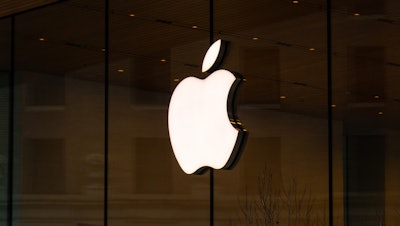
Apple has found itself on the wrong end of a civil antitrust lawsuit brought by the U.S. Department of Justice and 16 other state and district attorneys general. The lawsuit accuses Apple of monopolizing smartphone markets, violating the Sherman Act.
The complaint was filed in the U.S. District Court for the District of New Jersey. According to the lawsuit, Apple illegally maintains a monopoly over smartphones by selectively imposing contractual restrictions on, and withholding critical access points from, developers.
The DOJ says Apple undermines apps, products and services that would otherwise make users less reliant on the iPhone, promote interoperability, and lower costs for consumers and developers. The company also exercises its monopoly power to extract more money from consumers, developers, content creators, artists, publishers, small businesses and merchants.
Most Read on IEN:
- Can the World’s Largest Plane Save Wind Power?
- Unilever to Cut 7,500 Jobs
- PODCAST: GM Tattles on Drivers, Weird Chinese EVs, CEO Sells Fake Implants
- Pair Accused of Stealing Battery Manufacturing Secrets from Tesla
In a statement, Attorney General Merrick Garland says Apple has allegedly held monopoly power in the smartphone market by violating federal antitrust law, not just by staying ahead of the competition on its own merits. "If left unchallenged, Apple will only continue to strengthen its smartphone monopoly," Garland adds.
The lawsuit contends that Apple uses its control over the iPhone to engage in a broad, sustained and illegal course of conduct designed to maintain its monopoly while extracting as much revenue as possible. The complaint alleges that Apple's anticompetitive course of conduct has taken several ever-evolving forms, including:
- Blocking Super Apps: Apple has disrupted the growth of apps with broad functionality that would make it easier for consumers to switch between competing smartphone platforms.
- Suppressing Mobile Cloud Streaming Services: Apple has blocked the development of cloud-streaming apps and services that would allow consumers to play video games and other cloud-based applications without paying for expensive smartphone hardware.
- Excluding Cross-Platform Messaging Apps: Apple has made the quality of cross-platform messaging worse, less innovative and less secure for users.
- Diminishing Functionality of Non-Apple Smartwatches: Apple has limited the functionality of third-party smartwatches, so users who purchase the Apple Watch face substantial out-of-pocket costs if they do not keep buying iPhones.
- Limiting Third-Party Digital Wallets: Apple has prevented third-party apps from offering tap-to-pay functionality, inhibiting the creation of cross-platform third-party digital wallets.
The complaint also alleges that Apple's conduct affects web browsers, video communication, news subscriptions, entertainment, automotive services, advertising and location services.
"For years, Apple responded to competitive threats by imposing a series of 'Whac-A-Mole' contractual rules and restrictions that have allowed Apple to extract higher prices from consumers, impose higher fees on developers and creators, and to throttle competitive alternatives from rival technologies," says Assistant Attorney General Jonathan Kanter, in a statement. He says the lawsuit seeks to ensure Apple cannot deploy the same tactics in other vital markets.
Apple is a publicly traded company. In fiscal year 2023, Apple generated annual net revenues of $383 billion and net income of $97 billion.






















